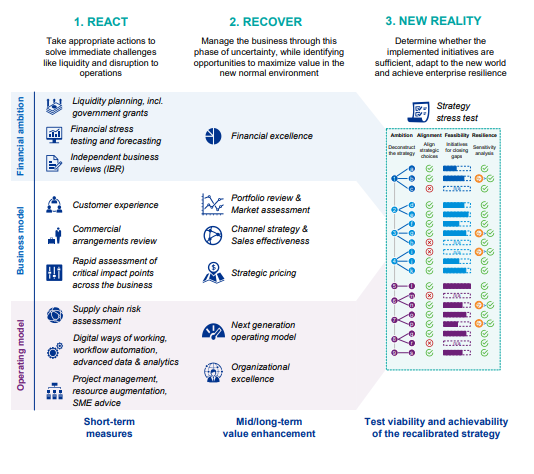Covid-19 pandemic has changed and disrupted all businesses. Covid-19 is also the major digital transformation accelerator, taking the digital economy to new heights. Let’s take a look at the major business challenges with covid and digital transformation and how businesses can get better prepared for the future.
Covid-19 has disrupted the entire world economy. Most businesses have been forced shut their activity for months and while governments all around the world have tried their best to support them, the economic freeze means that many have had to re-invent themselves to the new reality or face closure.
SMEs have been especially hit by the pandemic and as the Covid-19 continues its disruption, the livelihood of many entrepreneurs and SMEs owners have been threatened.
Only in 2020, UK retailers suffered their worst annual sales performance on record, driven by slump in demand for fashion and homeware products, according to the British Retail Consortium (BRC). Likewise, more than 50,000 listed companies worldwide have lost around 19.4 trillion euros in value within the first six weeks of the pandemic. This decline is historically unprecedented
for such a short time period.
Implementing Operational Resilience
The most immediate challenge for businesses is to stay afloat and become resilient by implementing operational resilience to withstand shocks and capture emerging opportunities. In this regard, the maturity of an organization’s operational resilience has the potential to dictate whether an organization will survive crisis situations. The ability to withstand operational shocks and continue to deliver core business processes in such situations must be seamlessly integrated into the pursuit of delivery excellence, cost efficiency and operational effectiveness.
According to a KPMG report, digital transformation is key in building that resilience as disruptions in technology-driven operations are less likely. “Events like the COVID-19 pandemic can have a lasting impact on market dynamics. Beyond immediate actions, organizations can use such a disruption as an opportunity to reflect on their ability to understand and meet rapidly changing customer demand and behaviors. They can consider actions to increase responsiveness and resilience,” was stated in the report.
The report focus on a series of actions that businesses have to do to implement a resilient operational organization:
· Reconfigure global and regional supply chain flows, incl. evaluation of near-shore/ in-house options to shorten supply chains and substitute suppliers.
· Digitize core processes wherever possible to enable remote operations.
· Re-evaluate strategic technology investments and accelerate programs
which actively support resilience.
· Enhance usage of intelligent automation and robotic process automation
· Consider cyber security as part of the business and acquisition strategy.
· Establish e-learnings and a collaboration platform to promote new ways of working and maintain employee engagement.
· Defining leadership that ensures teams do not work in silos and are aligned to the new and updated agenda.

The Digital Economy Accelerates
Despite the evident medical emergency, the coronavirus pandemic has also accelerated digital transformation, providing new opportunities, especially for small businesses struggling with the adoption of digital tools.
This accelerated digital transformation is blurring the boundaries of the real and digital economy, as companies must adapt to the crisis and build resilient models for the future.
As Andy Wyckoff, Director, OECD, Directorate for Science, Technology and Innovation explains it: “The digital economy is here, and growing every day, sometimes in surprising ways. Government leaders should be in no doubt about the key role they must play in securing the digital economy’s future as a driver of productive and inclusive progress. (…)
“The digital economy is a powerful catalyst, and a driver of inclusiveness, by linking communities to each other in a sort of “global village”, sharing information, ideas and products, and allowing countries to rise up the value chain.”
Ways to move when it comes to Covid-19 disruption:
1. Cut the losses, take action and move forward.
2. Accelerate Digital transformation, connect up with relevant business networks.
3. Moving fast, get balance while fostering a healthy honest change management mindset with teams.
4. Managing negativity and information overload with training – focus on coaching & leveraging with industry events and peers.
5. Selecting what makes sense, training your workforce and adapting towards the right focus.
The digital economy has in fact kept the economy afloat in most parts of the world, with businesses rapidly adapting to the digitization of traditionally reluctant processes like remote working or e-commerce.
Remote Working has surged during the pandemic. The transition to working remote full-time has been a shock to the system—figuratively, and in some cases, quite literally, when user demand has exceeded system bandwidth. But the silver lining is that with such a high percentage of the working population now remote, digital collaboration is improving in leaps and bounds, both in terms of the sophistication of the tools to facilitate it and workers’ level of comfort with it.
Omnichannel Commerce has kept businesses sales alive. As many physical business locations are shut down, consumers are turning to online shopping to meet their needs, even those who had historically been reluctant to do so. like groceries. Businesses are blending the physical and the digital to provide for their customers through delivery methods such as curbside pickup and contactless delivery. Physical-digital integration is more important now than ever before.
Institutions and organizations of all types are trying out digital platforms to stay above water during the pandemic, which has promoted platformification. The fitness industry has shifted to holding virtual classes on streaming services, both live and pre-recorded. Almost every school, from elementary schools through graduate programs, have shifted to online courses. Large-scale conferences and events are being held virtually. The NYSE has moved entirely to online trading. While some businesses will revert to their traditional models when the crisis abates, others may opt for a hybrid approach as they recognize the benefits of recurring revenues.
In Conclusion
For becoming resilience and navigate the covid-19 pandemic, businesses have to do the following:
Businesses need to focus 100% on digital transformation.
Business growth with Covid-19 requires a technology focus first approach!
Collaboration and partnerships are critical and digital and offline have to co-exist!
To Adapt to the Ongoing Crisis, SMBs need to turn to Internet Tools and adapt their business models with tech digital tools.
Businesses will have to learn to Balance Running Businesses while Caring For their Households.
Businesses have to embrace change, adapt with digital transformation + tech mindset.

Dinis Guarda is an author, academic, influencer, serial entrepreneur, and leader in 4IR, AI, Fintech, digital transformation, and Blockchain. Dinis has created various companies such as Ztudium tech platform; founder of global digital platform directory openbusinesscouncil.org; digital transformation platform to empower, guide and index cities citiesabc.com and fashion technology platform fashionabc.org. He is also the publisher of intelligenthq.com, hedgethink.com and tradersdna.com. He has been working with the likes of UN / UNITAR, UNESCO, European Space Agency, Davos WEF, Philips, Saxo Bank, Mastercard, Barclays, and governments all over the world.
With over two decades of experience in international business, C-level positions, and digital transformation, Dinis has worked with new tech, cryptocurrencies, driven ICOs, regulation, compliance, and legal international processes, and has created a bank, and been involved in the inception of some of the top 100 digital currencies.
He creates and helps build ventures focused on global growth, 360 digital strategies, sustainable innovation, Blockchain, Fintech, AI and new emerging business models such as ICOs / tokenomics.
Dinis is the founder/CEO of ztudium that manages blocksdna / lifesdna. These products and platforms offer multiple AI P2P, fintech, blockchain, search engine and PaaS solutions in consumer wellness healthcare and life style with a global team of experts and universities.
He is the founder of coinsdna a new swiss regulated, Swiss based, institutional grade token and cryptocurrencies blockchain exchange. He is founder of DragonBloc a blockchain, AI, Fintech fund and co-founder of Freedomee project.
Dinis is the author of various books. He has published different books such “4IR AI Blockchain Fintech IoT Reinventing a Nation”, “How Businesses and Governments can Prosper with Fintech, Blockchain and AI?”, also the bigger case study and book (400 pages) “Blockchain, AI and Crypto Economics – The Next Tsunami?” last the “Tokenomics and ICOs – How to be good at the new digital world of finance / Crypto” was launched in 2018.
Some of the companies Dinis created or has been involved have reached over 1 USD billions in valuation. Dinis has advised and was responsible for some top financial organisations, 100 cryptocurrencies worldwide and Fortune 500 companies.
Dinis is involved as a strategist, board member and advisor with the payments, lifestyle, blockchain reward community app Glance technologies, for whom he built the blockchain messaging / payment / loyalty software Blockimpact, the seminal Hyperloop Transportations project, Kora, and blockchain cybersecurity Privus.
He is listed in various global fintech, blockchain, AI, social media industry top lists as an influencer in position top 10/20 within 100 rankings: such as Top People In Blockchain | Cointelegraph https://top.cointelegraph.com/ and https://cryptoweekly.co/100/ .
Between 2014 and 2015 he was involved in creating a fabbanking.com a digital bank between Asia and Africa as Chief Commercial Officer and Marketing Officer responsible for all legal, tech and business development. Between 2009 and 2010 he was the founder of one of the world first fintech, social trading platforms tradingfloor.com for Saxo Bank.
He is a shareholder of the fintech social money transfer app Moneymailme and math edutech gamification children’s app Gozoa.
He has been a lecturer at Copenhagen Business School, Groupe INSEEC/Monaco University and other leading world universities.










